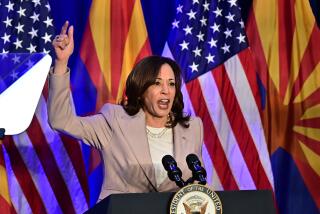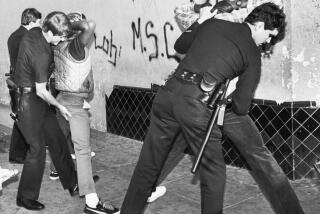State official links troubled foster care system to human trafficking
Speaking at a UCLA symposium on human trafficking Friday, California Atty. Gen. Kamala Harris talked about how the state’s broken foster care system is contributing to the problem.
“Human trafficking is not a monolith. There are many components,” Harris said, adding that “of all the discrete parts contributing to our concern about human trafficking, our foster care system is a big one.... The foster care system in California is not working.”
During her address, Harris said that 59% of children arrested on prostitution-related charges in L.A. County spent time in the foster care system.
The 2010 statistic drew audible gasps from the audience of more than 100 law students, county officials and victim advocates.
Harris said she had witnessed the problem firsthand years ago, while prosecuting a gang rape case in Alameda County. The victim was a teenager who lived in a group home.
“She was so vulnerable to anyone who would give her attention,” Harris said, noting that, as is often the case with victims of human trafficking, the girl was a difficult witness.
While testifying against her attackers, the girl crossed her arms, smacked her gum and avoided eye contact. Harris chose to address the girl’s attitude during her closing remarks to jurors.
“I said, ‘I know you don’t like her,’” Harris recounted. “‘And I will tell you, that’s exactly what those predators counted on.’”
Harris won the conviction and said that when she thinks about that girl now it reminds her of the importance of labeling her -- and others like her -- as victims, not “teen prostitutes.”
“That reads: mini criminal,” she said. “We cannot treat our witness like a criminal.”
A front-runner in the race to fill Barbara Boxer’s U.S. Senate seat, Harris also touched on transnational crime issues during her speech.
She recounted a 2011 visit to the border town of Calexico, where she saw elaborate tunnels used to smuggle drugs, weapons and people into the U.S. from Mexico. Officials at the border told her they’d seen kids as young as 5 being trafficked through the tunnels.
One of the biggest ways to stop human trafficking, Harris told the crowd, was to keep caring about the issue and to educate others.
“Part of what is insidious about human trafficking,” she said, “is that people don’t see what they’re seeing.”
More to Read
Start your day right
Sign up for Essential California for news, features and recommendations from the L.A. Times and beyond in your inbox six days a week.
You may occasionally receive promotional content from the Los Angeles Times.






